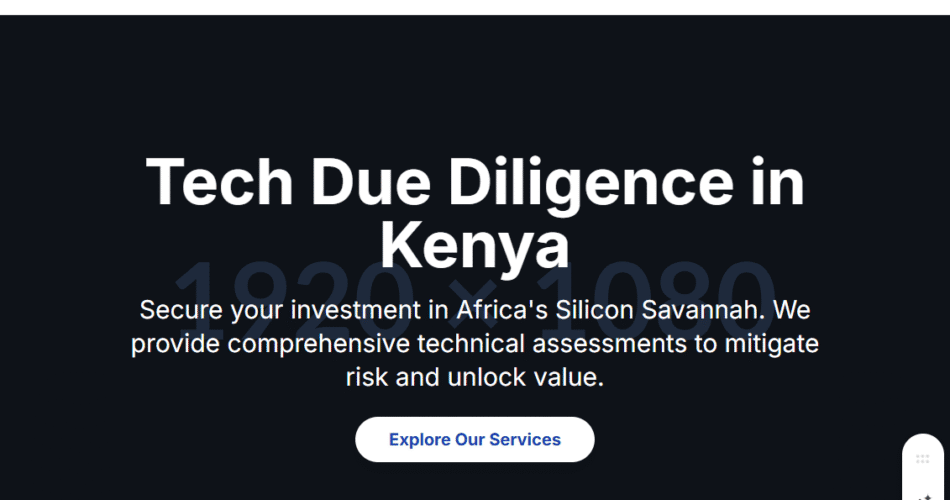Tech Due Diligence Kenya
- Delivery Time2 Weeks
- English levelProfessional
- LocationUSA, United Kingdom, United Arab Emirates, Nairobi, Kilimani, Kenya, Dubai, CBD Nairobi, Canada, Australia
Service Description
The cost of Tech Due Diligence in kenya is 500000KES.Get Tech Due Diligence in kenya at a price of 400000KES at Black Shepherd Technologies.
Gain a comprehensive understanding of Tech Due Diligence in Kenya. Explore the key areas of assessment, including software, infrastructure, cybersecurity, and team capabilities. Discover why a thorough tech DD is crucial for investors, acquirers, and businesses in Kenya’s rapidly growing digital economy.
Tech Due Diligence (Tech DD) in Kenya is a critical process for businesses, investors, and acquirers navigating the country’s dynamic and burgeoning technology landscape. As Kenya solidifies its position as a major tech hub in Africa, with a thriving startup ecosystem and a growing number of digital businesses, a deep dive into a company’s technological health is no longer a luxury—it is a necessity. This comprehensive assessment goes beyond traditional financial and legal due diligence to scrutinize the technical underpinnings of a business, mitigating risks and uncovering opportunities.
The core purpose of Tech DD in the Kenyan context is to provide a clear and objective picture of a company’s technological capabilities, assets, and liabilities. For investors and acquirers, this means validating the technology that underpins the business model, ensuring it is scalable, robust, and aligned with market demands. For the company being evaluated, a pre-emptive Tech DD can identify and rectify potential weaknesses, making it a more attractive target and potentially securing a higher valuation.
A typical Tech DD in Kenya involves a multi-faceted analysis, examining several key areas:
1. Technology Strategy and Product Assessment: This stage evaluates the product’s market fit, its unique selling proposition, and its long-term roadmap. It includes an in-depth review of the company’s tech stack, looking at the architecture, code quality, and the use of third-party libraries. This helps determine the product’s scalability, maintainability, and the level of “technical debt”—shortcuts or non-optimal solutions that could hinder future growth.
2. Cybersecurity and Data Protection: In an era of heightened digital threats, a thorough cybersecurity audit is paramount. This part of the diligence assesses the company’s security posture, including its data protection policies, vulnerability management, and compliance with data privacy laws such as Kenya’s Data Protection Act. It identifies potential security gaps that could lead to data breaches, reputational damage, or legal penalties.
3. IT Infrastructure and Operations: This analysis scrutinizes the company’s technological backbone. It examines the reliability and scalability of its servers, cloud services (such as AWS or Google Cloud), and network infrastructure. The due diligence process also reviews the efficiency of IT operations, including backup and disaster recovery plans, to ensure business continuity in the event of an outage.
4. Development Team and Processes: The human element is a significant factor in any tech-driven company. This component of Tech DD evaluates the competence and structure of the engineering and IT teams. It assesses the company’s development methodologies (e.g., Agile or Scrum), quality assurance practices, and the ability to attract and retain skilled talent in a competitive market. A strong, well-organized team is a key indicator of a company’s ability to innovate and execute on its strategy.
5. Intellectual Property (IP) and Licensing: A vital part of Tech DD is a review of the company’s intellectual property. This involves verifying the ownership of software, patents, trademarks, and other proprietary assets. It also checks for proper licensing of open-source components and third-party software to avoid legal and financial risks associated with intellectual property infringement.
In Kenya, several local and international firms, including major players like Deloitte, KPMG, and EY, as well as specialized local consultants, offer Tech Due Diligence services. They bring a combination of global best practices and a deep understanding of the local market dynamics. The process, while varying in duration based on complexity, typically takes several weeks and involves a collaborative effort between the due diligence firm, the target company’s management, and key stakeholders.
Ultimately, Tech Due Diligence serves as a strategic risk mitigation tool. It provides a data-driven foundation for a fair valuation, helps in crafting a seamless post-merger integration plan, and ensures that all parties involved are making informed decisions based on a clear and comprehensive understanding of the technology at the heart of the deal. In a market as vibrant and rapidly evolving as Kenya’s, this process is indispensable for unlocking the full potential of a tech-enabled business.
The demand for Tech Due Diligence in Kenya is accelerating, driven by several key factors within the country’s economic and technological landscape. Kenya’s digital economy is a powerhouse, projected to contribute over KSh 600 billion to the GDP by 2028. This growth is fueled by strategic government policies like the “Digital Superhighway Project,” which aims to expand fiber optic cable coverage and public Wi-Fi hotspots, creating a robust digital infrastructure.
This rapid digitalization has made Kenya a magnet for both domestic and foreign investment. The country has consistently ranked as a leader in African startup funding, attracting significant capital in sectors beyond the traditional fintech dominance, with climate-tech and agri-tech emerging as major investment areas. This diversification of the tech ecosystem, with high-profile deals in companies like d.light and BasiGo, underscores the need for specialized technical assessments to accurately value and de-risk these opportunities.
Furthermore, a notable trend in Kenya’s tech ecosystem is the increasing number of mergers and acquisitions (M&A). As the market matures, established startups are acquiring competitors to gain market share or talent, while struggling early-stage ventures are seeking mergers to survive. This heightened M&A activity, particularly in the fintech sector, makes Tech DD an essential tool. It helps buyers and investors identify and navigate risks related to outdated technology, security vulnerabilities, or poor product-market fit that might not be apparent from financial statements alone. The rise of AI and other emerging technologies also adds a new layer of complexity, requiring diligence on data sources and AI capabilities.
In conclusion, Tech Due Diligence is no longer a niche service in Kenya’s business landscape but a fundamental component of strategic decision-making. The country’s strong foundation in digital infrastructure, combined with a vibrant and maturing startup ecosystem, creates a fertile ground for investment. However, with this growth comes increased complexity and potential risks. A comprehensive Tech DD provides the necessary insights to navigate this environment, ensuring that investors and acquirers can confidently assess the true value of a technology company. By scrutinizing everything from code quality and cybersecurity to team capabilities and intellectual property, Tech DD helps secure deal value, mitigate future liabilities, and ultimately fosters a more transparent and resilient tech market in Kenya.








